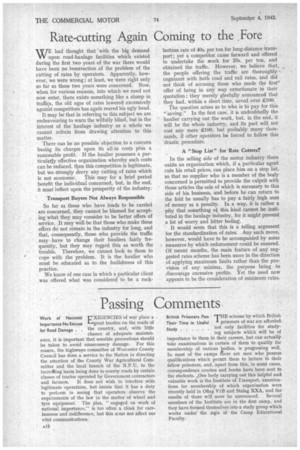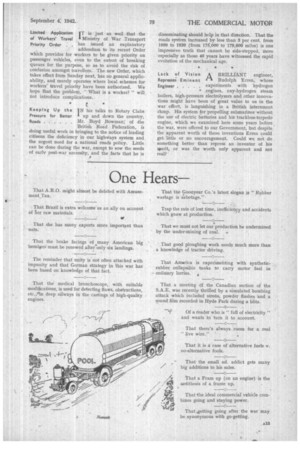Passing Comments,
Page 14

Page 15

If you've noticed an error in this article please click here to report it so we can fix it.
EXIGENCIES of war place a i—agreat burden on the roads of the country, and, with little chance of adequate maintenance, it is important that sensible precautions should be taken to avoid unnecessary damage. For this reason, the highways committee of Worcester County Council has done a service to the Nation in directing the attention of the County War Agricultural Committee and the local branch of the N.F.U. to the increlting harm being done to county roads by certain classes of tractor operated by Government contractors
and farmers. It does not wish to interfere with legitimate operations, but insists that it has a duty to perform in seeing that operators observe the requirements of the law in the matter of wheel and tyre equipment. The plea, "engaged on work of national importance," is too often a cloak for carelessness and indifference, but this rust not affect our vital communications. Work of National Importance No Excuse for Road Damage . .
British Prisoners Pass HE scheme by which British Their Time in Useful I prisoners of war are afforded.
Study not only facilities for study
ing subjects which will be of importance to them in their careers, but can actuallir take examinations in certain of them to qualify for membership of various odies, is progressing well. In most of the camps Sere are men who -possess qualifications which permit them to lecture to their fellow prisoners, and, apart from this, in some cases, correspondence coufSes and books have been sent to the students. aOne body carrying out this helpful an4 valuable work is the Institute of Transport, examinations for membership of which organization were recently held in Oflag VlB and Stalag XXA, and the results of these will soon be announced. Several members of the Institute are in the first camp, and they have formed themselves into a study group which works undef the xgis of the Camp Educational Faculty.
IT is just as well that the I Ministry of War Transpprt has issued an explanatory addendum to its recent Order which provides for workers to be given priority on passenger vehicles, even to the extent of breaking queues for the purpose, so as to avoid the risk of confusion amongst travellers. The new Order, which takes effect from Sunday next, has no general applicability, and merely operates where local schemes for workers' travel priority have been authorized. We hope that the problem, " What is a worker? " will not introduce complications. Limited Application of Workers' Travel Priority Order . .
Keeping Up the IN his talks to Rotary Clubs Pressure for Better up and down the country, Roads Mr. Boyd Bowman; of the
British Road Federation, is doing useful work in bringing to the notice of leading citizens the deficiency in our highways system and the urgent need for a national roads policy. Little can be done during the war, except to sow the seeds of early post-war necessity, and the facts that he is disseminating should help in that direction. That the roads system increased by less than 3 per cent. from 1899 to 1939 (from 17&000 to 179,600 miles) is one impressive truth that cannot be side-stepped, more especially as those 40 years have witnessed the rapid evolution of the mechanical age.
ABRILLIANT engineer, Rudolph Erren, whose experiments with hydrogen • engines, oxy-hydrogen steam boilers, high-pressure electrolyzers and other innovations might have been of great value to us in the war effort, is languishing in a British internment dump. His system for propelling submarines without the use of electric batteries and his trackless-torpedo engine, which we examined here some years before the-war, were offered to our Government, but despite the apparent worth of these inventions Erren could get little or no encouragement. Could we not do something better than repress an inventor of his merit, or was the worth only apparent and not real? '
Lack of Vision Represses Eminent Engineer .




















































